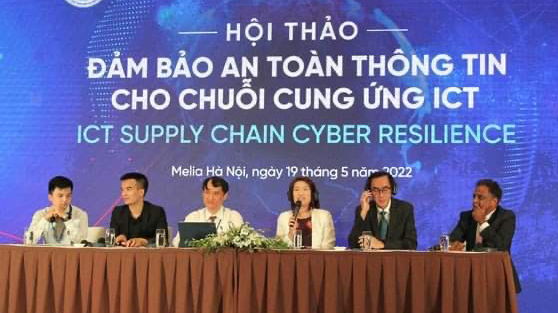
HÀ NỘI — Recognising that cyberattacks targeting the ICT supply chain are increasing, experts said that organisations in Việt Nam needed to be prepared to respond by sharing and updating knowledge about this form of attack.
The Authority of Information Security under the Ministry of Information and Communications and the security firm Kaspersky co-organised a workshop titled “ICT Supply Chain Cyber Resilience” in Hà Nội on Thursday.
The workshop aimed to support and prepare the country to respond to cyberattacks on the ICT supply chain.
“Cyberattacks on the supply chain have grown strongly during the COVID-19 pandemic period and are expected to increase in the near future as well as the appearance of organisations and enterprises providing cyber attack weapons,” said Nguyễn Thành Phúc, director of the Authority of Information Security.
“Therefore, sharing and updating knowledge related to this type of attack will help organisations respond promptly when an attack occurs,” he added.
Emphasising that cyberattacks on the supply chain are a concerning threat, Lê Công Phú, deputy director of the Việt Nam Cybersecurity Emergency Response Teams/Coordination Center (VNCERT/CC), said that in a supply chain attack, if the target was a software or hardware provider, the attack on the supply chain would be amplified.
The expert said that the information security risks caused by the ICT supply chain needed to be controlled by many measures, including proactive monitoring and early detection of cyberattack risks, information about security vulnerabilities for timely warning and response.
Products and services developed by external vendors must comply with the DevSecOps (Development – Safety – Operation) model to ensure safety, he said, at the same time, ensuring that products and services are tested and evaluated for safety before being put into use.
In addition, Phú also recommended that the ICT supply chain should be considered the weakest security link in IT infrastructure, thereby implementing the assessment of the security status of the supply chain, and identifying and securing the connection between the organisations and its supply chain.
Agencies and organisations were also recommended to model the threats that they might encounter, perform system penetration testing, and proactively track down potential security threats.
In addition to building processes and implementing incident response plans to cyberattacks and security incidents, organisations and businesses also needed to have a recovery plan when incidents occur to limit the impact and ensure system continuity, he said.
From an enterprise perspective, a Kaspersky representative said that a solution for stakeholders, including Government agencies and non-governmental organisations, to reduce risks was to improve information security capacity, thereby improving the ability to respond flexibly in the ICT supply chain.
The characteristics of the ICT supply chain required better response capacity as well as closer linkages at each organisation, individual and region, said Genie Gan, head of Public Affairs for the APAC region at Kaspersky.
Many countries and international organisations had been step by step strengthening information and business experience co-operation and sharing, the representative added.
International cooperation was a key to building a common defence against cross-border threats, she noted. — VNS
- Reduce Hair Loss with PURA D’OR Gold Label Shampoo
- Castor Oil Has Made a “Huge” Difference With Hair and Brow Growth
- Excessive hair loss in men: Signs of illness that cannot be subjective
- Dịch Vụ SEO Website ở Los Angeles, CA: đưa trang web doanh nghiệp bạn lên top Google
- Nails Salon Sierra Madre
 VnExpress News The News Gateway of Vietnam
VnExpress News The News Gateway of Vietnam




